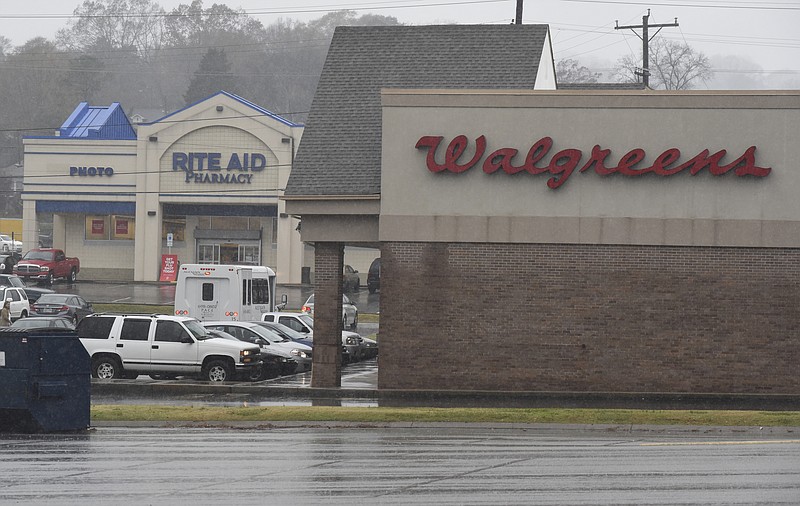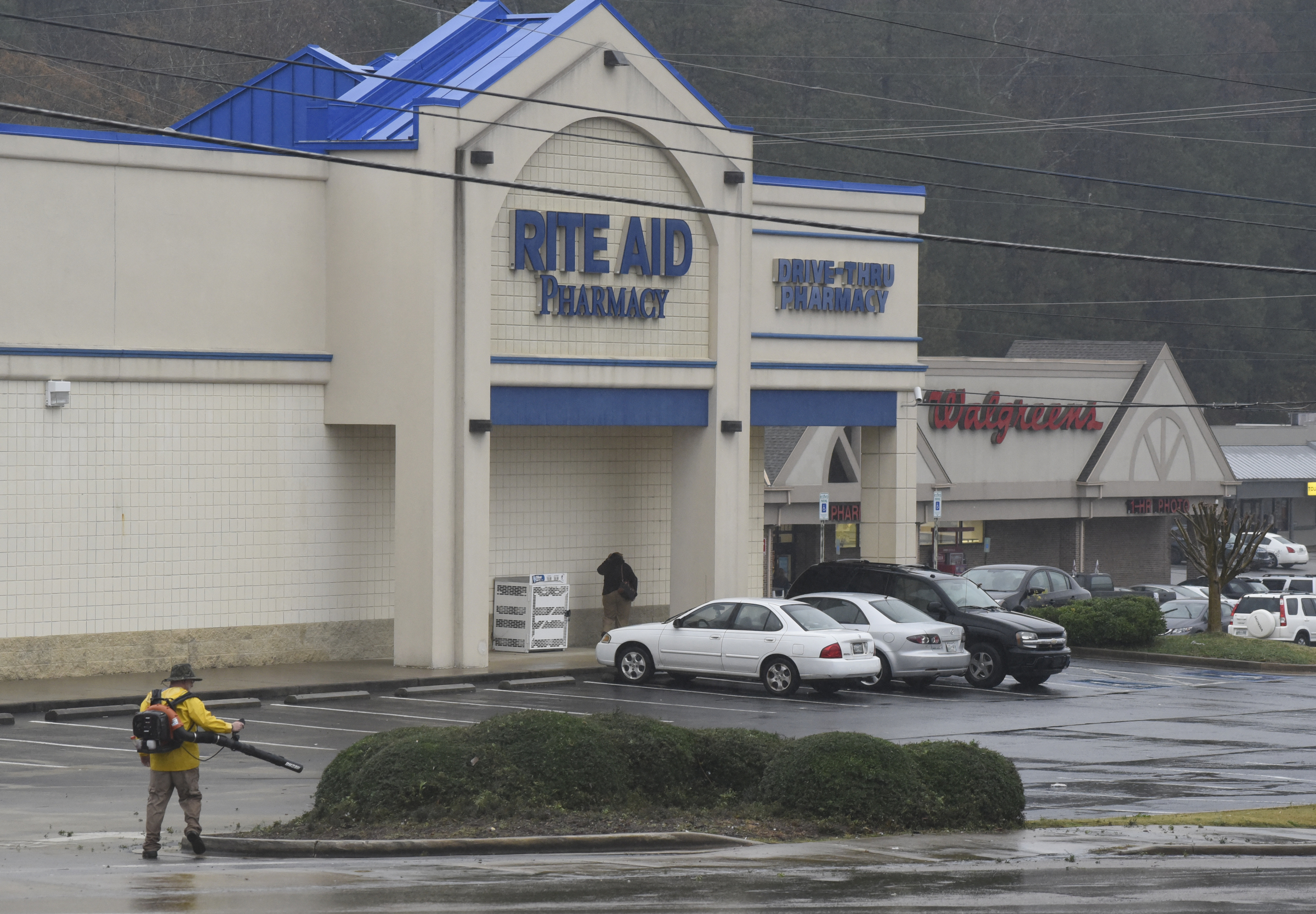More Info
Rite Aid • Rite Aids in Tennessee: 81 • Rite Aids in Georgia: 187 • Rite Aids in Alabama: 93 • Chattanooga-area Rite Aids: 16 • Chattanooga-area cities with at least one Rite Aid: Calhoun, Ga.; Chattanooga; Cleveland, Tenn.; Dahlonega, Ga.; Dalton, Ga.; Dayton, Tenn.; East Ridge; Ellijay, Ga.; Etowah, Tenn.; Fort Payne, Ala.; Red Bank; Rome, Ga.; Ooltewah, Tenn.Walgreens • Walgreens in Tennessee: 253 • Walgreens in Georgia: 203 • Walgreens in Alabama: 113 * Chattanooga area Walgreens: 27 * Chattanooga area cities with Walgreen stores include Boaz, Ala.; Chattanooga; Chatsworth, Ga.; Cleveland, Tenn.; Dayton, Tenn.; Dunlap, Tenn.; East Ridge; Fort Oglethorpe; Fort Payne, Ala.; Dalton, Ga.; Dunlap, Tenn.; Fort Payne, Ala.; Ooltewah, Tenn.; Ringgold, Ga.; Rome, Ga.; Rossville, Ga.; Soddy Daisy, Tenn.Bordering stores • Six locations where Rite Aid and Walgreens are across the street in the Chattanooga area: Dayton Boulevard, Red Bank; Hwy. 153, Hixson; Ringgold Road, East Ridge; Brainerd Road, Chattanooga; Rankin Avenue, Dunlap, Tenn.;Rhea County Highway, Dayton
The 16 Rite Aid pharmacies in the greater Chattanooga area could be rebranded, repurposed - or left vacant - after Walgreens spends $17.2 billion to buy Rite Aid in a merger that's expected to take place in the second half of 2016.
It's anyone guess what will happen, since Walgreens officials won't say much.
"Customers will be able to use their Rite Aid store without interruption," Walgreens spokesman Jim Graham said in an email, "and we will provide more information as we progress into our integration planning."
A national retail analyst thinks Walgreens may shed as many as 3,000 stores, most of which would be Rite Aids - especially when they're right across the street from one another. In the greater Chattanooga area, six Walgreens and Rite Aids stand across the street from one another, according to a Times Free Press analysis.
"It is not unreasonable to assume that there may be as many as 3,000 existing Walgreens and Rite Aid stores today that will eventually be closed or sold off over the next few years as a result of this deal," wrote Garrick Brown, a vice president of research at the Chicago-based global commercial real estate service company Cushman & Wakefield in a detailed blog post this month about the Walgreens-Rite Aid merger.
"In many instances, we are talking about competing Rite Aid and Walgreens stores across the street from one another," wrote Brown, whose office is in Sacramento, Calif. "Who will win in those instances? In most cases, it will be the Walgreens location."
Other factors are in play that would make Walgreens lean toward closing Rite Aids, he said.
"In some regions, Rite Aids are unionized. Those stores probably have a target on their back," Brown told the Times Free Press during an interview. "[Walgreens has] fought unionization wherever it's popped up."
He's almost certain that Walgreens will rebrand Rite Aid stores as Walgreens.
And even if they're not right across the street from one another, many Rite Aids and Walgreens are near one another. Brown found about 3,100 zip codes that have both a Walgreens, which are in all 50 states, and a Rite Aid, which are in 31 states and the District of Columbia.
Ending leases tricky
Getting rid of unwanted Rite-Aids could be tricky - and expensive - for Walgreens, because the big, chain drug stores don't own much real estate. Instead, they typically lease commercial space for 25, 50 - even 75 years.
"There's a few 75-year leases," Brown said. "[Big chain pharmacies] get a locked-in rate, which in the long term is cheaper - but doesn't give them much flexibility."
Chattanooga commercial property expert David DeVaney, president of NAI Charter Real Estate Corp., says that "99.9 percent" of chain drug stores are housed in leased space, and Walgreens would have to honor those leases - which might mean shuttered Rite Aids would sit empty until the leases expire.
Or, Walgreens could offer to buy out leases, DeVaney said.
Building owners might jump on that offer and use the money to repurpose their buildings, DeVaney said, "if it's a good location and they feel like they can put something else in there make a little retail center out of it."
There is a very good chance that the Federal Trade Commission (FTC) might object to Walgreens' takeover of Rite Aid, Brown said, on the grounds that it will effectively turn the U.S. drug store market into a duopoly with CVS and Walgreens dominating the field.
The FTC might push for Walgreens to divest itself of ownership of a "sizable number of stores," Brown said.
CVS has about 7,800 stores nationally while Walgreens would have close to 12,800 stores after the merger. Rite Aid has a little fewer than 4,600 stores, including the 1,521 Eckerd drug stores that Rite Aid gained in 2006 when it purchased Eckard, which was once the fourth-largest drug store chain. Eckerd operated 16 pharmacies within 50 miles of Chattanooga, including nine stores in Hamilton County.
Private equity to step in?
He thinks Walgreen's may find a buyer who wants to purchase excess stores from the Walgreens takeover - even above the number that the FTC might ask Walgreens to shed - and keep them going as drug stores.
"Private equity groups are sniffing around," Brown said. "I have a feeling that we won't see nearly the number of closures that could be, because I have a feeling they're going to be selling off a bunch of stores to some private equity group to make this happen."
"Private equity groups are flush with cash," he said. "They're looking for opportunities."
Drug stores appeal to private equity firms, Brown said, "because they love the demographics of it."
Baby Boomers are aging, he said, and more Americans in general use prescription drugs.
While it would be difficult to start a large chain drug store from scratch, a private equity group could buy up a regional drug store chain and have it go national, Brown said.
Brown says that Walgreens expects to save about $1 billion in the deal, including through the layoff of redundant employees and stronger buying power with vendors and pharmaceutical companies.
Contact staff writer Tim Omarzu at tomarzu@timesfreepress.com or www.facebook.com/MeetsForBusiness or twitter.com/meetforbusiness or 423-757-6651.

